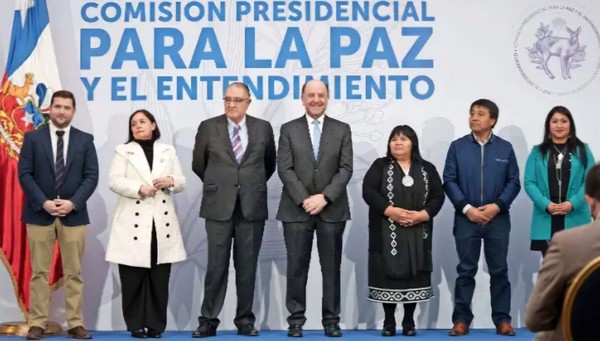According to the governor of the Biobío Region, Rodrigo Díaz, the "numbers don’t add up" for this to be a viable proposal. The Presidential Commission for Peace and Understanding has until January 31:
After requesting an extension from the Executive, the eight members of the Presidential Commission for Peace and Understanding will have until January 31 to deliver a final report to the President of the Republic, Gabriel Boric, proposing solutions to the historic indigenous conflict with the State.
In this context, former constitutional convention member and commission member Adolfo Millabur, alongside Gloria Callupe, presented a proposal that some within the commission consider somewhat "complex," particularly because some of its points, according to experts, resemble demands from the first constitutional text, which was rejected by a wide margin in communes with the highest percentage of indigenous population.
"All texts are being discussed and analyzed one by one," say sources from the commission, which began its work over a year ago, holding sessions every Thursday at La Moneda.
Territorial Restitution
The second chapter of a 41-page document discusses "Lands and Territories" and how land restitution could be carried out.
"Reparations must be made to the Mapuche People, based on the historical loss of their territory. Thus, out of the 12,267,000 hectares that represent the four regions—and therefore the Mapuche or Ngulumapu territory—it must be assessed how much of that area can be restituted, subtracting cities, roads, and small private properties," the text states, adding: "The current institutionalized Mapuche demand is summarized in the following table: 1,552 communities representing 45,437 families across the four regions require 385,860 hectares of agricultural land. To avoid increasing the cost of these reparations, measures must be implemented in the short and medium term."
It also specifies that "without prejudice to the above, it must be considered that there are currently 4,315 communities, of which we know 1,552 have institutionalized their demands. Consequently, there is a universe of over 2,000 communities representing a potential land demand."
Another section on the same topic proposes: "A minimum of 12 agricultural hectares per family will be allocated. In the case of forest land, a minimum of 30 hectares per family will be allocated."
When asked about Millabur’s proposal, Biobío Governor Rodrigo Díaz stated that the main focus of the commission’s discussion should be that "a criterion of realism must prevail to build a viable proposal. There are places that are now cities, and clearly, if you consider the economic and physical availability of the territory, those numbers don’t add up from any perspective."
Former Minister Alfredo Moreno, from the commission, assures that proposals on the table are being carefully studied to deliver a viable final report. In this regard, he states that "the issue of land restitution is very important in the discussion, but naturally, the State does not have all those lands available, and a balanced solution must be found that does not create problems for other people."
Autonomous Institutions
"Legally recognizing the autonomous institutions and traditional Mapuche forms of organization" is another proposal included in the document. It explains that "in this line, the right to Mapuche self-governance regarding their institutions, practices, and ancestral authorities will be guaranteed. Additionally, based on this, the Mapuche People must have the freedom to apply for reparation alternatives, using the organizational forms they deem most appropriate."
Deputy Jorge Rathgeb of the Araucanía Region claims the idea is "unworkable under current regulations because anyone could self-identify as belonging to an indigenous people (given the level of mestizaje), as it is very difficult to distinguish who is or isn’t Mapuche. We already have this problem with the Indigenous Law, and this idea would only make it worse."
Pardon for Those Convicted in Territorial Dispute Contexts
Another idea in the proposal by Millabur and Callupe is that "all those convicted in the context of territorial disputes, who are not involved in violent crimes against people or common crimes, may receive a special pardon from the President or Congress."
Regarding this, Governor Díaz of Biobío argues that such an idea must consider all victims: "Any proposal must encompass all victims, meaning both Mapuche and non-Mapuche. There are other crimes that are not violent, such as those linked to drugs, and they cannot be pardoned," Díaz comments.
Source:El Mercurio







Comentarios (0)
No hay comentarios aún. ¡Sé el primero en comentar!
Deja un comentario